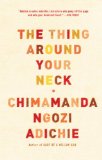Summary | Excerpt | Reading Guide | Reviews | Beyond the Book | Read-Alikes | Genres & Themes | Author Bio

Critics' Opinion:
Readers' Opinion:
First Published:
Jun 2009, 240 pages
Paperback:
Jun 2010, 240 pages
 Book Reviewed by:
Book Reviewed by:
Marnie Colton
Buy This Book
This article relates to The Thing Around Your Neck
Nigeria has long been renowned for its distinguished literary history, which features such world-famous authors as Chinua Achebe, Ben Okri, and Wole Soyinka. What many Westerners don't know, however, is that Nigeria also boasts a thriving movie-making industry, dubbed Nollywood in homage to both Hollywood and Bollywood (India’s film industry). Nollywood films, released directly to DVD, generate approximately $286 million per year for Nigeria’s economy; Nollywood distributors release around 2,400 per year to an eager audience that has essentially eschewed American films.
The traditional Nigerian film industry, unlike that of many other African countries, never really took off, with poverty and political uprisings preventing a commitment to celluloid. Many Nigerian theaters languish in a state of decline, further contributing to home viewing as a replacement for movie going. Making Nigerian movies costs a fraction of making their American counterparts: according to one estimate, shooting a complete Nigerian film costs the same as shooting six seconds of an American one. The DVDs themselves are quickly released to customers who patronize local markets to seek out the latest films from prolific directors, producers, and actors whose names they recognize and whose work they trust. At a mere $2 per copy, Nigerian films are priced to appeal to a devoted public. "Working in celluloid was exclusive," says one interviewee in the documentary Welcome to Nollywood, directed by Jamie Meltzer. Straight-to-DVD films eliminate this gap and allow Nigerians to see themselves in engaging stories via an accessible format.
While countries like Burkina Faso and Senegal have a reputation for producing poetic, slowly paced films, Nigerian videos are predicated on the advertising premise that more is better: jump cuts, loud music, eye-popping visuals, and elaborately shaped wipes and fades characterize these films. By Western standards, the plots would be considered B movie material, as many feature melodramatic situations more commonly seen in soap operas (abductions, affairs, secret identities, and the supernatural). Because these tales function primarily as vehicles for actors to show their chops, though, exceptional acting might redeem an outlandish plot.
In a footnote to his essay "Stress Warriors" in Nollywood: The Video Phenomenon in Nigeria, Pierre Barrot also points out that "[the] supernatural…is a key element which is understood by many in the audience as a real presence and is therefore not classified as being in the 'realms of the imaginary.'" Nollywood films most dramatically differ from other film traditions by portraying the clash between Christianity and traditional religions. These films often convey messages that disparage cultism and ritual beliefs in favor of espousing Christianity, often showing a child's soul as the battleground between good and evil.
Some of the producers and directors in Welcome to Nollywood offer interesting reasons for their films' emphasis on dramatic interactions between characters as opposed to the sci-fi, fantasy, and action that spell big box office in the United States. "Every Nigerian or African is a storyteller," says one interviewee. "People can relate to the stories," says another. "They're very dialogue-oriented, because we are a speaking people." Indeed, the clips shown in the documentary reflect a kinship with reality TV, despite being scripted. But perhaps the most compelling argument for why these films have caught on like wildfire comes from Jimi Odumosu, owner of a Nigerian TV station: "Going to the cinema is the best cure for stress that I know, you escape the real world, you become less tense, you feel better." Replace "going to the cinema" with "watching DVDs" and you have an eloquent description of Nollywood's appeal.
Interesting Links
Filed under Music and the Arts
![]() This "beyond the book article" relates to The Thing Around Your Neck. It originally ran in July 2009 and has been updated for the
June 2010 paperback edition.
Go to magazine.
This "beyond the book article" relates to The Thing Around Your Neck. It originally ran in July 2009 and has been updated for the
June 2010 paperback edition.
Go to magazine.





The Flower Sisters
by Michelle Collins Anderson
From the new Fannie Flagg of the Ozarks, a richly-woven story of family, forgiveness, and reinvention.

The House on Biscayne Bay
by Chanel Cleeton
As death stalks a gothic mansion in Miami, the lives of two women intertwine as the past and present collide.

The Funeral Cryer by Wenyan Lu
Debut novelist Wenyan Lu brings us this witty yet profound story about one woman's midlife reawakening in contemporary rural China.
Your guide toexceptional books
BookBrowse seeks out and recommends the best in contemporary fiction and nonfiction—books that not only engage and entertain but also deepen our understanding of ourselves and the world around us.